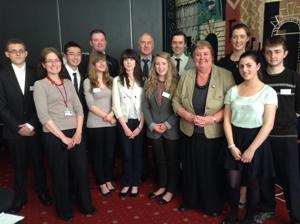Geography students get hands-on with council's census stats
Release Date 30 April 2013

Geography students from the University of Reading have been helping to analyse the latest census statistics for local government officials.
Dozens of people attended a presentation at Reading Borough Council's offices on 23 April looking at the latest findings of the 2011 census.
The event outlined the partnership work between the council and University of Reading students who have spent the last two months analysing the census data for Reading and picked out key points.
The council uses census statistics as a base for understanding what the population it serves looks like, how it has change since the last census in 2001 and to forecast what the population might look like in future years.
The partnership working has also given the nine students from the University's Department of Geography and Environmental Science valuable work experience on a real-life project - another example of how Reading students gain crucial employability skills as they enter the world of work.
The 2011 census covered a range of key topics including health, the economy, housing, population, diversity and was broken down by ward.
Among a wealth of information highlighted by the students, the census data from Reading shows:
- The population of Reading is 155,698 - 77,967 men and 77,731 women. Of these 14,836 are students
- 68% of the working age population has a job, while 32% does not
- Over 91% of Reading residents speak either fluent or very good English - less than 1% do not speak English at all. British Sign Language is the first language of 47 people in Reading
- The biggest employment group in Reading is transport, storage and communications (15.7%), followed by retail (15.5%)
- Over a third of Reading residents have a degree or postgraduate qualification
Council Leader Jo Lovelock, said: "We asked the students to produce a borough profile document setting out the key data from the census which we can use to inform policies and plans and support bids for funding. The information will also go on our website so it can be used by the public. I'd like to thank the students for all their work on this project.
"We use the census data to understand, for example, the demand for school places, housing and care provision and to plan for the future. It helps us understand the characteristics of different geographic areas and communities so we can target our services and activities."
Dr Steve Musson, the academic who oversaw the students' work, said: "It was really good to see the students put the skills they learn in lectures and tutorials into practice.
"As we've found, students make up almost 10% of the population of Reading, so I think it is really important that we find ways to get involved in the wider community. Doing work that will make a difference over the coming years is excellent training for our students, and benefits the whole of Reading".
ENDS
The University of Reading is a top 1% global university (THE World University Rankings). As well as offering an excellent range of academic courses which students rate highly, the University integrates employability skills, work experience opportunities and careers advice into all of its undergraduate degree courses, delivered from a beautiful campus environment. More information from the University's Careers, Placement and Experience Centre.
